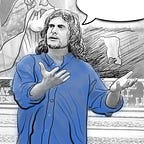Denver’s First Christmas
1858 was the first Christmas in the tiny mining camp of Denver and the only children who lived there, perhaps a half dozen, were sad, certain that they were not yet on Santa’s map. There were 200 men in Denver and only five women. Four of the women were married. Most of the men were sad and lonely. That one single girl was extremely popular.
Everyone in Denver however was 600 miles from the nearest railroad and 200 miles from the nearest post office. There would be no cards and letters nor gifts and packages to be exchanged and opened from friends and family only recently left behind. The sense of isolation was terrible and led to a community wide holiday depression.
Unbeknownst to these first citizens of Denver; help was arriving in the form of an unlikely Santa Claus. Richen Wootton was a Santa Fe merchant daring the snowbound trails in search of profit. Wootton, his wife, and their two small children rode from Fort Union, New Mexico towards Denver in two ox carts.
Christmas morning, December 25, 1858 was soft, filled with sunshine, and not a chill breeze blew from any direction. It was a welcome respite from the typical terrible Colorado winter. The sound of Richen Wootton’s wagons wheels creaking through the snow could be heard far and wide on the still winter morning. The breath of the hard
working oxen made great clouds of frost. Henry Edward Warner reminisced about the scene for the Denver Times in 1900. “The sun had just rubbed its sleepy eyes and peeped in on the little settlement when Santa Claus made his appearance.”
Wootton unloaded his trade goods and set up a tent. By this time a crowd of curious onlookers had arrived. Wootton rolled a barrel down from one of the wagons and took an axe to it — cracking it open. Inside, the barrel was filled with Taos Lightning, the infamous moonshine of the wild west. It was the first whiskey to reach the Denver prospectors.
Said Warner, “It hit the stomach all in a lump and sent cheerful feeling up to the roots of a fellow’s hair and back again to his toes, in one howling rip roaring succession of luxurious vibratory spasms of exquisite joy. It beat grand opera without even trying.
Witness A. E. Pearce said, “Uncle Dick gave the whole town a free blowout. Everyone helped himself freely, using tin cups.” A bonfire was built in the city streets and a hoe down commenced. The men locked arms and danced to songs such as “The Girl I Left Behind” and the “Star Spangled Banner.” Another witness wrote, “and in the weird light we danced until midnight. Groups of Indians with their squaws and papooses filled the shadowy background. It was a picture that Rembrandt would have loved.”
Mrs. Wootton gathered the local children to decorate a Christmas tree and sing Silent Night. Denver was given its first Christmas and a legendary character who was known for the rest of his life in his new hometown as “Uncle Dick.”
